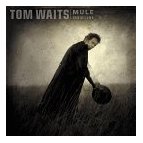|
Contents » Cover
» Poetry |
||
|
Reviews
Tom Waits' first album of new music in over six years occupies a place in his large oeuvre similar to what Blood on the Tracks was for Bob Dylan and New York for Lou Reed. Appearing towards the end of a decade and following a personal transformation in the artists' life, each of these three albums re-presents a masterful songwriter at the top of his game and imbued with maturity and a renewed seriousness of purpose. In other words, just when you thought they'd just about shot their wads the great artists return refreshed and energetic at fifty and create what are, arguably, their masterpieces. And Mule Variations is, altogether, the most powerful and cohesive album Tom Waits has ever produced—one of the best albums of the decade. Now fifty, Waits has somehow managed to maintain the vitality in the perspective of his first-person "character" songs while yet achieving an artistic detachment Dylan or Reed never quite got—and his storytelling, as in "What's He Building," have never been spookier, or funnier. And this is an area of some complexity for Waits. His faux-gospel piano pieces, such as "Come on Up to the House" and "Take it With Me" off the present album are neither sentimental or ironic—they're both. And the cutting first-person irony of "Big in Japan", "Lowside of the Road" and especially "Chocolate Jesus" (which is already a classic—who else can create an instant classic like Waits?) are meta-ironic, meaning they dryly take a standard ironic means of expression and treat it to a further level. I can think of no contemporary American artist except perhaps Barry Hannah who does this so effectively. Listeners may hear an element of a more genuine spirituality in this album, and when I say that I do it's in the most unlikely places—not the faux-gospel Waits but rather the upbeat, rocking "Cold Water" and the bluesy "Get Behind the Mule." One could almost hear John Lee Hooker doing Waits' "Georgia Lee"; whereas before many of Waits' blues references could be seen as parodic, here they are the real thing, in which the spirit is implicit in the music of the song and in the voice itself. Then, for those of us who like the grungy, whacked-out Waits: put the CD on "Filipino Box Spring Hog" and set it to repeat over and over. This has got to be the most fucking mad song Waits has ever produced, which is saying something—I hear he's closing the shows on his current tour with it. And when it's all over, we still don't know Tom Waits, who is as private as he is accessible. He's said to have not had a drink in five years now—but Waits is never didactic, he's a rollicking ball of energy that just is, read into it what you will. And my favorite song on the album—"Hold On"—is probably the best Waits' ballad since "The Heart of Saturday Night", adding yet another dimension to a multi-textured artwork which prompts me to call it the best new album of the year. Hold on, indeed.
|
|||||
